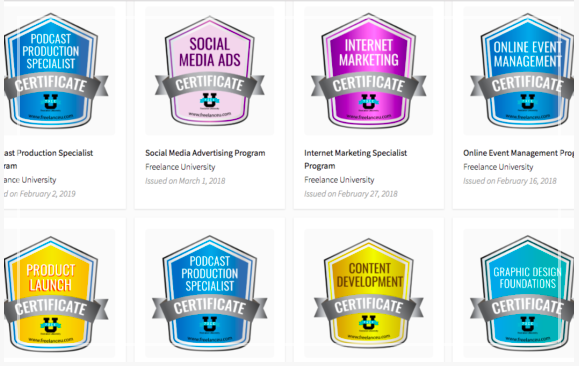How to Combat Imposter Syndrome in Your Freelance Business
By Jena Kroeker
Have you ever been plagued by self-doubt that holds you back from selling yourself and pursuing opportunities you’re fully qualified for? Imposter syndrome is a big problem for a lot of freelancers and virtual assistants, both new and experienced ones. If you talk to some of the most successful virtual professionals, you’ll be surprised at how often they struggle with this.
According to an article by Merriam-Webster called “Where Does ‘Impostor Syndrome’ Come From?” the term was first used by American psychologists Pauline Clance and Suzanne Imes, authors of a 1978 article, “The Imposter Phenomenon in High Achieving Women: Dynamics and Therapeutic Intervention.” Clance describes the phenomenon this way on her website:
“Even though [people] are often very successful by external standards, they feel their success has been due to some mysterious fluke or luck or great effort; they are afraid their achievements are due to ‘breaks’ and not the result of their own ability and competence. They are also pretty certain that, unless they go to gargantuan efforts to do so, success can not be repeated. They are afraid that next time, I will blow it.”
What does Imposter Syndrome feel like for an entrepreneur?
Years ago, I went on a camping retreat with some colleagues. We had arrived in a small town and decided to go for an evening walk in a park. A group of teenagers were sitting on the playground equipment there and started shouting at us for no reason. They eventually chased us out of the park, and the message they were trying to give us was this:
“You made a mistake coming here. You don’t belong.”
Now imagine that message coming from inside your own head as you build your virtual business. You take on clients, and despite their praise and continued business, you believe that one day they’ll see you as a fraud. You go to networking events or online conferences and imagine someone’s going to ask, “Who let you in? You don’t belong here.”
Believing you don’t have what it takes to be an entrepreneur and a master of your niche can be crippling. Yet, as Allie Gray Freeland says in her article, “How Freelancers Can Battle Imposter Syndrome,” it’s the very nature of freelancing that makes us susceptible. For example, she says social isolation can remove opportunities for positive feedback. And since our careers are built on connections and relationships, we can forget about our internal competency and attribute our success to outside factors.
How to combat imposter syndrome in your freelance business
Here are some strategies you can use to kiss the imposter in you goodbye:
1. Acknowledge your feelings.
The first step is not to be ashamed of your feelings. Remember that you are not alone. In fact, as W. Brad Johnson and David G. Smith state in their article, “Mentoring Someone with Imposter Syndrome,” 70% of people feel like imposters, including Facebook COO Sheryl Sandberg and actors Tina Fey and Tom Hanks.
Here are some questions you can ask yourself when imposter syndrome strikes:
• Did something happen to you recently that made you doubt yourself?
• Did someone say something that affected your self-esteem?
• Are you letting hurtful past experiences affect your present?
• Are you letting others’ perceptions shape your view of yourself?
As I mentioned in a previous blog post, “An Introvert’s Guide to Networking like a Rock Star,” I look younger than my age. When I was in my 30s, working a part-time job at a cafe during the day, a customer asked, “Why aren’t you in school right now?” (He meant high school.) To which I answered, “Because I’m 36 and graduated many years ago.” So, I need to constantly battle the fear that people will see me as a youngster, despite my age and qualifications.
2. Practice positive self-talk.
One of my favorite quotes from research professor and author Brené Brown is “Talk to yourself like you would to someone you love.” How often do you do that? I confess if I hit the wrong key on my computer or struggle to use software, I’m quick to say, “Well, that was stupid of me.”
But the imposter syndrome feeds off negative self-talk, so make an effort to monitor and choose your words wisely. In an article titled “Don’t Let Imposter Syndrome Derail Your Business,” Ann Vertel gives this helpful advice:
“Each time you hear its words in your head, reply using one of these words or phrases: nevertheless, noted, however, perhaps, maybe, if you say so or in any event. For example, ‘Yes, I’m not as experienced as my competitor, nevertheless I’m doing it anyway.’”
3. Outline your business progress.
In a recent Facebook Friday event for our FreeU community members, co-founder Craig Cannings discussed how to avoid the comparison trap in your business – where entrepreneurs compare their success to someone else’s and set up unreasonable expectations to fail. It’s similar to the imposter syndrome.
To combat this trap, Craig recommends creating a timeline of your business. Whether you’re at a high point or low point now, a bird’s eye view of your journey can encourage you. You’ll see how persistence has paid off and how you’ve navigated challenges along the way.
So, grab a piece of paper, a whiteboard or your favorite app and draw your timeline:
• Depending on how long you’ve been in business, divide it into weeks, months or years.
• Document at least one win you celebrated and one challenge you overcame for each time frame.
• Work your way toward the present and celebrate how far you’ve come!
4. Inventory the skills and abilities you’ve developed in the past year.
Here at Freelance University, we’re strong proponents of lifelong learning. Honing your skills so you can provide the best possible services to your client builds confidence. It lets you know you’re on top of your game and keeping pace with your industry and niche. Each certification we offer includes a digital certification delivered by Accredible.com. Students can share these badges on social media, and it’s a visual reminder of what they’ve learned.

Screenshot via https://www.freelanceu.com/university/
If you’re combating imposter syndrome, make a list of any training you’ve done over the past year, and what skills you’ve added or updated. Include all types of education, both online and offline. You may have learned a new skill while collaborating with a colleague or connecting at a network event. Include all those accomplishments.
In her article, “How these women entrepreneurs learned to battle impostor syndrome,” Kat Ambrose says,
“Even though one of the cornerstone facts of impostor syndrome is detracting from past accomplishments, seeing a physical list of all you’ve done may help you refocus your attention. You are capable, and you do deserve success.”
If you realize you haven’t added to your skill set in a while, seek new opportunities to enhance your services. Look for training or seminars to help fill in any gaps. Make some goals and pat yourself on the back for being proactive! The article above says, “Sometimes changing the external will cause the internal to follow,” and suggests tightening up bookkeeping, taking professional headshots, updating social profiles, and documenting and promoting past clients.
5. Surround yourself with people who challenge you and champion you.
At the beginning of this article, we talked about whether some of the voices in your head come from others. As freelancers and virtual assistants, we experience a freedom and lifestyle that people in the corporate world may find difficult to understand. When you were first starting out in your virtual business, did anyone try to discourage you from following this path? Did they say you might not have what it takes? Sometimes well-meaning friends and family encourage us to take a safer route because they worry about us and want us to succeed.
To silence the imposter in your head, surround yourself with people who can keep you accountable and encourage you:
• Learn from seasoned freelancers and virtual assistants who will guide you in your journey.
• Connect with peers or a mastermind group to share common experiences, commiserate about challenges, and celebrate victories.
• Adopt a business mentor who will challenge you when you’re feeling stuck.
As the article above says,
“Excellent mentors are attuned to imposter worries and are quick to counter them with copious doses of affirmation and encouragement. With good humor and grace, the wise mentor seeks opportunities to express belief in a mentee, reminding them that they do belong and are in fact competent.”
So, there you have it – five ways to combat imposter syndrome! And now we’d love to hear your thoughts. Have you struggled with imposter syndrome? If so, how do you counter those feelings? Please share your advice and strategies in the comments below!









































































































